Posts
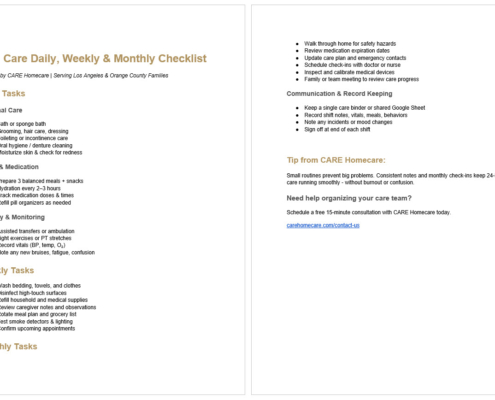
Printable 24/7 Care Checklist PDF - Daily, Weekly and Monthly Tasks
When your loved one requires 24-hour care, it can feel like the world suddenly runs on alarms, pillboxes, and endless to-do lists. But with a clear routine, even complex care schedules become manageable.
Whether you’re overseeing a professional care team or sharing shifts among family, this guide helps you stay organized, reduce burnout, and prevent small issues from turning into emergencies.

Why Discharge Planning Starts Before You Leave the Hospital
Leaving the hospital after surgery, an illness, or an emergency admission is a milestone. Families often assume it means the hardest part is over. In truth, the first days and weeks at home are some of the most fragile. The risk of complications, falls, and readmissions is at its peak. That is why discharge planning should not wait until the last morning on the ward. It should begin as soon as hospitalization does.
As expert home care providers in Los Angeles and Orange County, we see the same challenge again and again. Families get a stack of discharge papers, instructions they barely have time to process, and the responsibility to carry them out without professional help. When discharge planning starts early and includes a trusted home care agency, outcomes improve. Healing becomes smoother, families feel less overwhelmed, and the chance of a return trip to the hospital is significantly reduced.

Discharge Instructions Explained - A Caregiver’s Guide to Safer Recovery at Home
Leaving the hospital should bring relief but for many families it also brings confusion. Every patient leaves with discharge paperwork, often a stack of forms that mix clinical language with hurried notes. These documents are not a formality. They are the blueprint for recovery.
Misreading or overlooking even one section can cause setbacks. Missed doses, skipped follow ups or uncertainty about wound care are common reasons for complications and hospital readmission. Understanding discharge paperwork is not optional. It is the first and most important step in recovery at home.
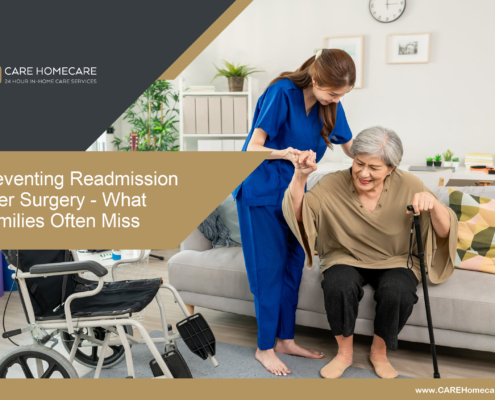
Preventing Readmission After Surgery - What Families Often Miss
Coming home after surgery should feel like a victory. In truth, it is the beginning of a fragile phase where every detail matters. Hospitals discharge people once they are stable enough to leave, not fully healed. The first days and weeks at home involve new routines, new medications, physical limitations, and emotional stress. That combination makes this period one of the riskiest times for hospital readmission.
The reality is many of these readmissions are avoidable. Families often underestimate the daily challenges of recovery. Meals get skipped or lack protein. Prescriptions pile up and confusion sets in. A trip to the bathroom at night leads to a fall. Appointments are missed because getting to the car is too exhausting. Each gap seems small but together they add up.
At CARE Homecare, we specialize in closing those gaps. As a trusted home care provider in Los Angeles and Orange County, our caregivers support families through this delicate transition. By focusing on daily life—nutrition, mobility, medication reminders, safety, and companionship—we reduce the risks that commonly send people back to the hospital.
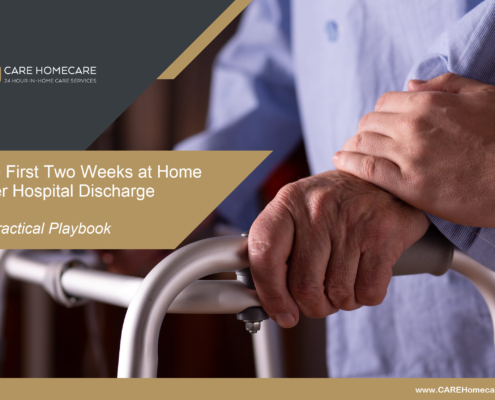
The First Two Weeks at Home After Hospital Discharge - A Practical Playbook
Leaving the hospital can feel like crossing the finish line. Doctors say you are medically stable. Nurses hand you discharge instructions. Then suddenly you are home, facing the reality of recovery without the 24-hour safety net of hospital care. For most patients the first two weeks after discharge are the hardest. The body is weak, the mind is foggy, and families are scrambling to manage care while holding their own lives together.
At CARE Homecare, we specialize in guiding families through this fragile window. We know that the decisions made in these first days determine whether recovery is smooth or whether complications send a loved one back to the hospital.
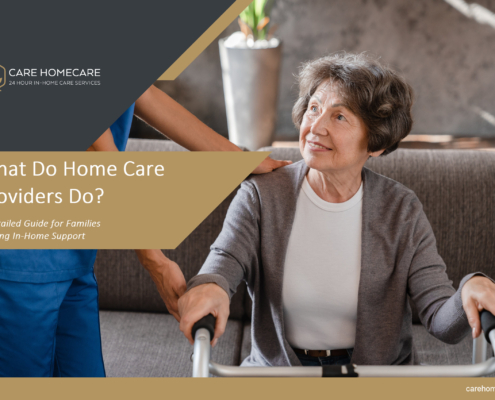
What Do Home Care Providers Do? A Detailed Guide for Families Seeking In-Home Support
For many older adults, staying at home feels far more comforting than moving into an unfamiliar facility. Living in familiar surroundings can bring a sense of stability, especially for those recovering from illness, managing chronic conditions, or navigating the changes that come with aging.
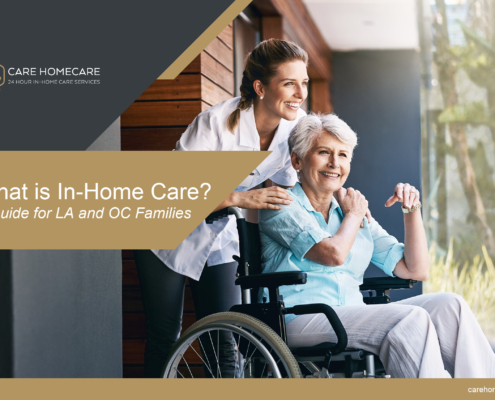
What Is Home Care? A Guide for Families in Los Angeles and Orange County
In-home care is a service designed to help seniors and individuals with disabilities maintain their independence while receiving support in their own homes. Unlike assisted living facilities, in-home care provides one-on-one attention, allowing for a more personalized approach to health and daily living needs.

Benefits of Choosing In-Home Care Over Assisted Living in Southern California
As families in Southern California explore options for senior care, the choice often comes down to in-home care versus assisted living. While both provide essential services, in-home care allows seniors to remain in their familiar environment while receiving personalized support. For many families in Los Angeles and Orange County, this option not only enhances comfort but also preserves independence and connection to the community.
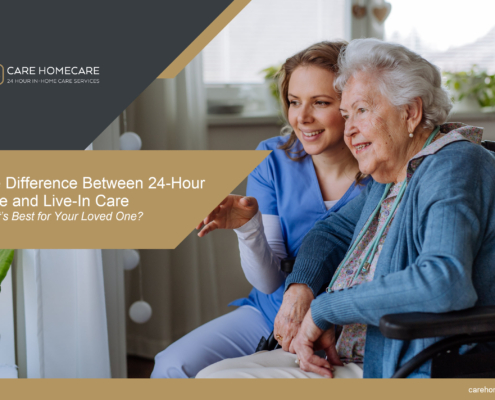
The Difference Between 24-Hour Care and Live-In Care | What’s Best for Your Loved One?
24-hour care is designed for seniors who require continuous monitoring and assistance throughout the day and night. This model involves two or three rotating caregivers who provide non-stop attention, ensuring that someone is always available to assist with Activities of Daily Living (ADLs), medication reminders, mobility support, and safety supervision.

Promoting Senior Health and Wellness in West Hollywood and Los Angeles with CARE Homecare
Maintaining health and wellness is vital for seniors, especially in bustling areas like West Hollywood and Los Angeles. With the right support and resources, elderly individuals can enjoy a high quality of life, remaining active and engaged…
